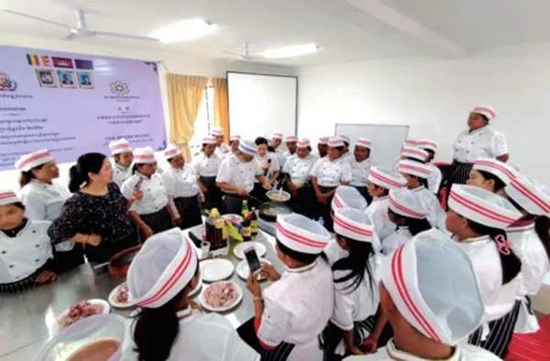Celebrating 100th anniversary of CPC | Cambodian woman chases big city dream with help of China’s vocational training
On Nov 13, 2014, at the ASEAN-China-Japan-South Korea (10+3) leaders' meeting, China proposed implementing the Cooperation Initiative on Poverty Reduction in East Asia, carrying out rural poverty reduction promotion programs, and establishing the East Asia Poverty Reduction Demonstration Project.
In 2015, the Chinese government decided to cooperate with Cambodia, Laos and Myanmar to carry out technical assistance projects for poverty reduction in East Asia.
In February 2017, a Chinese resident expert group went to work in Chheuteal Phlos and Svay Ampear villages in Svay Ampear commune, Mok Kampoul district, Kandal province, Cambodia.
The group in response to the causes of poverty in the project villages, drew on China's successful experience in whole-village promotion and targeted poverty alleviation, adapted to local conditions, and focused on managing poverty-causing factors and meeting development needs in order to plan and design a series of measures such as infrastructure, public services, environmental improvements, livelihood improvements, capacity building and technical assistance, which have been highly appreciated by the people in these areas.

Leng Jiangdi is the eldest daughter of her parents and the only worker in the family. They live in a small village called Chheuteal Phlos. It's in Svay Ampear commune, Mok Kampoul district, Kandal province, Cambodia.
Like many young people, Leng said she yearned for the outside world and wanted to work in Phnom Penh. But she was embarrassed that she hadn't learned the skills needed to get a job.
Leng said she looked for training opportunities, but didn't know what to learn in Phnom Penh when faced with a wide range of programs. More importantly, the training fees were too high for her. So she had to return to her village in disappointment.
She was as happy as the other villagers to see a brand-new house built with the help of the China-Cambodia Joint Project Management Office (JPMU) of the East Asia Poverty Reduction Demonstration Project. But after a few days of happiness, her mood dropped to a low point again. "Will I stay here for the rest of my life and farm like my parents? Will I be like them in my old age, waiting for someone else to build me a new house?" Leng said.
However, her anguish did not last long. A labor skills training course soon started at a community activity center funded by JPMU.
After studying the labor market, JPMU invited Chinese pastry chefs from Phnom Penh, officials from the department of agricultural economics, and experienced domestic service professionals to teach the trainees.
Wearing a chef's hat and apron, Leng was excited to begin her course. After the training was completed, she passed her final examination and got her certificate of completion.
During the training period, the Chinese experts contacted Chinese companies in Phnom Penh. As soon as the training was over, six trainees were hired by pastry shops, Chinese restaurants and beauty salons in Phnom Penh. Leng was one of them.

Follow us on WeChat
京ICP备18041594号-1
京公网安备 11010202005508号

Follow us on WeChat


